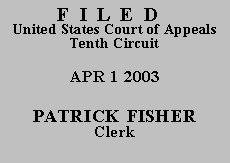

| UNITED STATES OF AMERICA,
Plaintiff-Appellee, v. JAMES PAT HUNT, Defendant-Appellant. |
No. 02-6392 (D.C. Nos. 00-CV-388-M and 97-CR-127-M) (W.D. Oklahoma) |
James Hunt, a federal prisoner appearing pro se, appeals the denial of his motion to vacate, set aside, or correct sentence pursuant to 28 U.S.C. § 2255. The district court granted a certificate of appealability (COA) on Hunt's "claim of ineffective assistance of counsel based upon trial counsel's alleged violation of [Hunt's] right to testify on his own behalf." ROA, Doc. 124 at 2. Hunt seeks a COA on additional issues.(1) Exercising jurisdiction pursuant to 28 U.S.C. §§ 1291 and 2253(a), we affirm the district court denial of relief on the ineffective assistance of counsel claim and deny a COA on the additional issues.
A jury convicted Hunt of possession of methamphetamine with intent to distribute in violation of 21 U.S.C. § 841(a)(1) and he was sentenced to a term of imprisonment of 360 months. We affirmed his direct appeal. United States v. Hunt, 1999 WL 140415 (10th Cir. March 16, 1999).
In his § 2255 motion, Hunt alleged: (1) the district court was without jurisdiction to enhance his sentence for prior convictions; and (2) ineffective assistance of counsel. The court granted Hunt's request to file a supplemental brief addressing the decision in Apprendi v. New Jersey, 120 S. Ct. 2348 (2000). After a thorough analysis of each of Hunt's claims, the district court denied relief.
Hunt asserts his trial counsel was ineffective because counsel refused to let him testify in spite of his expressed desire to do so. To establish ineffective assistance of counsel, a defendant must show, among other things, prejudice flowing from deficient representation, i.e., "there is a reasonable probability that, but for counsel's professional errors, the result of the proceeding would have been different." Strickland v. Washington, 466 U.S. 668, 694 (1984). Hunt asserts that if he had testified, he would have (1) denied living at the house where the methamphetamine was found, (2) denied that he was present at the house at the time he allegedly sold methamphetamine to a government informant, and (3) denied traveling with one of the government witnesses to California.
We have reviewed the record on appeal and Hunt's filings with this court and we agree with the district court that he has not established prejudice. See Fox v. Ward, 200 F.3d 1286, 1295 (10th Cir. 2000) ("An ineffective assistance claim may be resolved on either performance or prejudice grounds alone."), cert. denied, 531 U.S. 938 (2000). The evidence against Hunt was overwhelming. The government presented as evidence two utility bills for the house where the methamphetamine was seized which listed Hunt as the service customer. The government also presented testimony from two witnesses who stated that Hunt lived in the house. One witness testified he had been to Hunt's house "a number of times" and "helped [Hunt] move stuff to the house." ROA, Tr. at 69. Both witnesses testified they had been present in the house when Hunt sold methamphetamine. In addition, the government presented testimony of a forensic chemist supervisor who had tested the substance found in the house and determined it to be methamphetamine. The government also presented evidence that items seized from the house, including scales (several of which bore Hunt's initials), baggies, syringes, and Vita Blend (a substance used to cut methamphetamine), were items typically used in the distribution of methamphetamine. In sum, Hunt has not shown a reasonable probability that the outcome of this prosecution would have been different if he had testified at trial.
Hunt has also failed to make a "substantial showing of the denial of a constitutional right," 28 U.S.C. § 2253(c)(2), with regard to the sentencing issues upon which he requests an additional COA. We DENY a certificate of appealability on those additional issues for substantially the same reasons set forth by the district court in its order denying relief. We AFFIRM the district court's order denying § 2255 relief. As we have concluded Hunt is not entitled to relief, we also DENY his request for a remand to district court for an evidentiary hearing. See United States v. Lopez, 100 F.3d 113, 119 (10th Cir. 1996). The mandate shall issue forthwith.
Entered for the Court
Mary Beck Briscoe
Circuit Judge
*.This order and judgment is not binding precedent, except under the doctrines of law of the case, res judicata, and collateral estoppel. The court generally disfavors the citation of orders and judgments; nevertheless, an order and judgment may be cited under the terms and conditions of 10th Cir. R. 36.3.
1. Hunt seeks a COA on the following additional issues: (1) The district court erred in sentencing him as a career criminal without a determination of drug quantities and without serving a notice of enhancement pursuant to 21 U.S.C. § 851(a)(1); (2) the district court erred in determining his prior convictions were not related; and (3) the court erred in determining that United States v. Jones, 235 F.3d 1231 (10th Cir. 2000) (holding quantity of drugs is an essential element of offense if it exposes defendant to a heightened maximum sentence), was not retroactive.